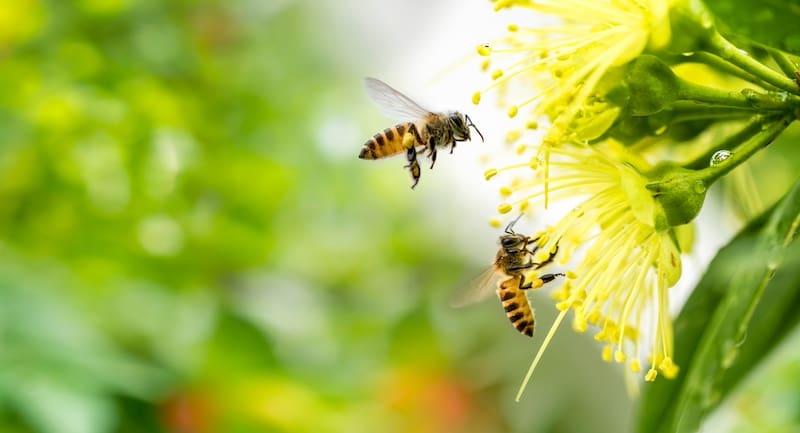
Pollinators like honeybees help farmers cultivate a multitude of crops that the USDA values in the billions of dollars. Courtesy of Shutterstock
Scientists are finding neonicotinoids – synthetic, neurotoxic pesticides that kill pollinators at alarmingly low doses – everywhere: in most pregnant women, in white-tailed deer, in farmland with no history of neonicotinoid use, in water, and in pollen collected by honeybees.
That’s a problem. Neonicotinoids contribute to widespread pollinator declines that threaten our food system. According to the Vermont Center for Ecostudies, more than 30% of Vermont’s native bee species are “critically imperiled or imperiled.” And it’s no longer unusual for Vermont’s beekeepers to lose more than half of their colonies over winter.
Farmers rely on pollinators to deliver a diverse, nutritious diet to Vermonters and beyond. Crops like peppers, pumpkins, apples, and blueberries depend on pollination services that the USDA values in the billions of dollars. Without pollinators, our food system would falter. And many of our farmers and beekeepers would be unable to earn a living.
So, where are these neonicotinoids coming from? Mostly from colorful insecticidal coatings applied to seeds sold to farmers. Neonicotinoid-treated corn and soybean seeds dominate Vermont’s working landscape. Yet, they provide almost no benefit to farmers.
Vermont’s legislature recognized the threat. It directed the Vermont Agency of Agriculture to work with the state’s Agriculture Innovations Board to develop best management practices for farmers using neonicotinoid-treated seeds. But the Board recommended research and education instead of best management practices. And the Agency misleadingly claimed that Vermont’s beekeeping industry is thriving, until beekeepers corrected them.
In the meantime, New York followed the science and passed legislation that curbs most neonicotinoid-treated seeds.
Now, the Pollinator Protection Bill allows Vermont’s legislators to take the matter back into their own hands by prohibiting most neonicotinoid-treated seeds from being used in the state. Legislators must seize that chance and set an example for the rest of New England to follow.
Neonicotinoid-treated Seeds Help Big Seed Companies, But They Hurt Farmers and Ecosystems
Just four agribusiness companies dominate the global seed industry: Corteva, BASF, ChemChina, and Bayer, which owns Monsanto. These large, powerful companies produce and patent genetically modified seeds. And they manufacture the pesticides that coat those seeds.
Agribusiness fondly touts neonicotinoid seed treatments as cheap insurance against pests like corn wireworm and seedcorn maggot. But study after study shows that farmers who use neonicotinoid-treated seeds see little or no benefit. That’s true in New York. It’s true in Pennsylvania. It’s true in Québec. It’s true in Ontario. And it’s true in Vermont. The price farmers pay for the seed treatments doesn’t justify the return.
Worse, neonicotinoids cost farmers more than money. More than 90% of the neonicotinoids applied to seeds enter surrounding waters, soils, plants, and air. Once there, the pesticides kill beneficial insects, like pollinators. Predator insects that feast on pests also suffer. The result is counterintuitive: seed treatments designed to curb pests can make pest problems worse by killing predators.
In response to these findings, agribusiness is peddling misinformation and discrediting experts, just like Big Tobacco and Big Oil before it. So much so that the European Academies Science Advisory Council describes “industry campaigns to maintain markets for pesticides through extensive lobbying, marketing and manipulation” as a major barrier to stemming unnecessary pesticide use.
Agribusiness knows that neonicotinoid-treated seeds damage the environment and do little for farmers who already struggle to make ends meet. But agribusiness also knows that bad products are profitable if they continue to sell.
Other Jurisdictions Already Regulate Neonicotinoid Treated Seeds
Some jurisdictions have seen through agribusiness’s charade. The European Commission banned the outdoor use of major neonicotinoids after finding that their use “could no longer be considered safe due to the identified risk to bees.” Québec requires farmers who want to use neonicotinoid-treated seeds to get a prescription from an agronomist before they do. Almost none do. Ontario requires farmers to complete integrated pest management (IPM) training, which emphasizes using pesticides as a last resort. And New York law will soon require farmers to undergo IPM training, develop a pest risk report, and obtain a waiver from New York’s Department of Environmental Conservation before planting neonicotinoid-treated seeds.
And just like the research predicted, seed company warnings of failed harvests and disrupted seed markets have proved false. For example, Québec’s farmers have not experienced any crop losses related to the province’s restrictions. Moreover, the same companies that claimed they’d have trouble transitioning their seed catalogs away from neonicotinoids quickly pivoted and now offer farmers alternatives.
Vermont Should Pass the Pollinator Protection Bill and Prohibit Most Neonicotinoid-treated Seeds
Vermont’s legislators can protect the state’s pollinators, ecosystems, and agricultural economy by passing the Pollinator Protection Bill.
The bill prohibits the use of most neonicotinoid-treated seeds and creates the conditions necessary for a smooth transition to alternatives. An emergency exemption allows Vermont’s Agency of Natural Resources and Agency of Agriculture to lift the prohibition if the seed fails to provide farmers with a sufficient supply of untreated seed or if enforcing the ban would cause farmers financial hardship. Not only that, but the Pollinator Protection Bill gives farmers, service providers, and seed companies until 2027 to prepare for the prohibition to take effect.
Neonicotinoid-treated seeds give farmers almost no benefit and threaten our pollinators. Only agribusiness companies benefit from their sale. Now is the time for legislators to protect Vermont’s farms and food system and pass the Pollinator Protection Bill.
You can help. Sign this petition to call on Vermont’s legislators to protect pollinators, support farmers, and phase out neonicotinoids.



